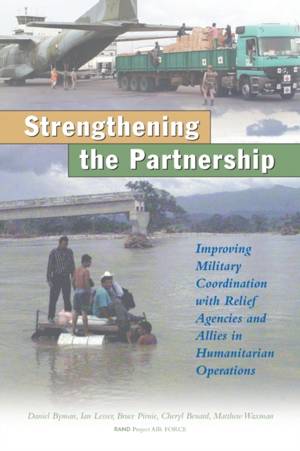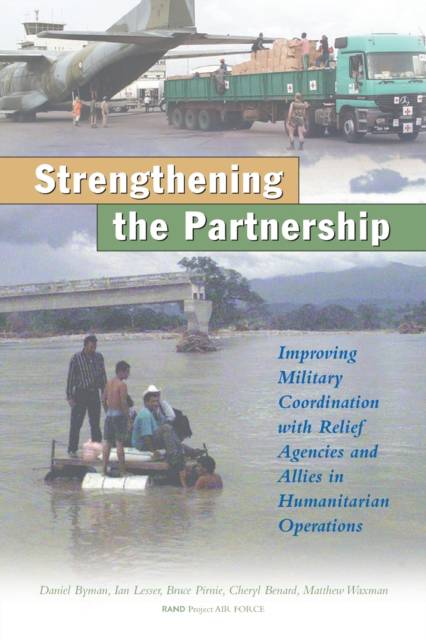
Je cadeautjes zeker op tijd in huis hebben voor de feestdagen? Kom langs in onze winkels en vind het perfecte geschenk!
- Afhalen na 1 uur in een winkel met voorraad
- Gratis thuislevering in België vanaf € 30
- Ruim aanbod met 7 miljoen producten
Je cadeautjes zeker op tijd in huis hebben voor de feestdagen? Kom langs in onze winkels en vind het perfecte geschenk!
- Afhalen na 1 uur in een winkel met voorraad
- Gratis thuislevering in België vanaf € 30
- Ruim aanbod met 7 miljoen producten
Zoeken
Strengthening the Partnership
Improving Military Coordination with Relief Agencies and Allies in Humanitarian Operations
Daniel Byman
Paperback | Engels
€ 37,95
+ 75 punten
Omschrijving
Many humanitarian interventions led and supported by the United States go beyond simple disaster relief and include such difficult tasks as protecting refugees, securing humanitarian aid, and restoring civil order. The U.S. Air Force often plays an important role in such complex contingency operations. MR-1185-AF explores how the military might improve coordination with relief agencies and with European allies in such operations. It examines the dynamics of complex contingency operations, provides an overview of the relief community, delineates barriers to better cooperation, discusses the European contribution, and recommends steps the military might take to improve coordination in future crises. Steps include improving military familiarization with key relief organizations humanitarian advisor, establishing more centers of excellence, and bringing relief organizations into the planning process.
Specificaties
Betrokkenen
- Auteur(s):
- Uitgeverij:
Inhoud
- Aantal bladzijden:
- 190
- Taal:
- Engels
Eigenschappen
- Productcode (EAN):
- 9780833028686
- Verschijningsdatum:
- 19/12/2000
- Uitvoering:
- Paperback
- Formaat:
- Trade paperback (VS)
- Afmetingen:
- 152 mm x 229 mm
- Gewicht:
- 353 g

Alleen bij Standaard Boekhandel
+ 75 punten op je klantenkaart van Standaard Boekhandel
Beoordelingen
We publiceren alleen reviews die voldoen aan de voorwaarden voor reviews. Bekijk onze voorwaarden voor reviews.









